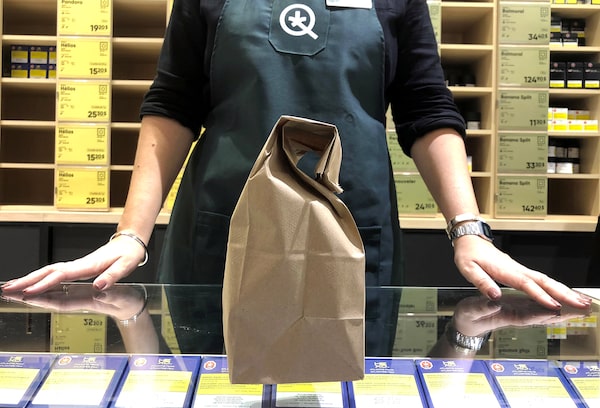A customer leaves an SAQ outlet on Jan. 6, the same day the Quebec government announced that vaccine passports will be required to enter all government liquor stores and cannabis outlets as of Jan. 18.Ryan Remiorz/The Canadian Press
Legal experts say Quebec’s plan to expand its vaccine passport requirement to include cannabis and liquor stores is likely legally sound, but may still face challenges from groups opposed to vaccine mandates.
Quebec’s government announced on Thursday that proof of vaccination will be required in provincially run liquor and cannabis stores as of Jan. 18, and warned that other non-essential services, such as shopping malls and hair salons, could be next. The measures are part of an effort to push more Quebeckers to get COVID-19 vaccines.
Officials have blamed the unvaccinated, who make up the majority of COVID-19 patients in hospitals, for straining the province’s health care system. Quebec’s passport requirements already apply to restaurants, gyms and other locations where people gather for recreation.
Under a COVID-19 curfew in Montreal, a lonely doorman stands watch over an empty city
A glimpse into Quebec’s COVID-19 curfew on four dark nights in two lonely cities
Cheryl Milne, a constitutional lawyer and executive director of the Asper Centre for Constitutional Rights at the University of Toronto, said the expansion of vaccine passports would likely stand up to any legal challenges, because unvaccinated people will still be able to access alcohol and cannabis through private retailers and delivery services.
“Obviously, they’re thinking they need to step up pressure on people who are refusing to be vaccinated,” Ms. Milne said.
“It’s untested at this point, but so far the courts, when looking at vaccine mandates or restrictions on liberty rights such as travel, have mostly sided with the provinces, who are trying to ensure vaccine compliance or public health measures to stop the spread of the virus.”
Ms. Milne said the Canadian Charter of Rights and Freedoms gives governments a great deal of agency to make decisions like these, especially in emergency situations such as pandemics.
Quebec has reported a spike in appointments for first doses of vaccines since the announcement – a sign the strategy is working. The province’s Ministry of Health and Social Services said 6,000 people booked first-dose appointments on Thursday, and an additional 3,000 did so by 5:30 p.m. on Friday. The ministry said there were around 1,500 daily first-dose bookings before the announcement.
On Friday, Quebec’s College of Physicians said in a statement that the government should use the vaccine passport system to further limit access to a large number of shops and public places.
François Vincent, the Canadian Federation of Independent Business’s vice-president for Quebec, criticized the idea of expanding the vaccine passport requirement to include more types of retail spaces. He said the move would put undue staffing and financial strain on businesses that are already struggling.

Legal experts say Quebec’s plans to expand its vaccine passport requirement to cannabis and liquor stores may face legal challenges, but they think the policies are legally sound.CHRISTINNE MUSCHI/Reuters
He argued that the government should reconsider the policy, or at least cover business owners’ additional staffing and equipment costs if they are required to enforce vaccine mandates.
“The strategy is to get people to get vaccinated, but you’re asking the private sector to do the job without giving them the tools,” he said.
Ms. Milne said jurisdictions may find themselves in muddier water if they begin restricting access to more essential services, such as grocery stores, based on vaccination status.
But she said courts could still rule in favour of those measures if the highly infectious Omicron variant of COVID-19 creates an even more dire situation in the country – or if a new, deadlier variant begins wreaking havoc.
Amir Attaran, a professor with both the faculty of law and the school of epidemiology at the University of Ottawa, said there is no legal barrier to federal and provincial governments making vaccines fully mandatory for most members of the general public.
Federal Health Minister Jean-Yves Duclos at a briefing on Friday nudged provinces and territories toward having conversations about that type of sweeping mandatory vaccination regime, saying it’s possible such a policy could become reality in the future.
Mr. Attaran said the most likely legal challenge to a broad vaccine mandate would have to do with the idea that it violated Section 7 of the Charter, which guarantees personal autonomy through the right to life, liberty and security. But he said that section places limits on individual rights if they affect another person’s life, liberty and security. It would be possible to argue that a strong vaccine mandate falls under that exemption, he said.
“The governments in Canada have yet to lose a lawsuit” regarding vaccine mandates, he added.
“As long as they set up a mechanism whereby persons having a medical or religious reason not to vaccinate are accorded reasonable exemptions, then they’ve demonstrated fundamental justice.”
Frank Addario, a Toronto lawyer, also said the new vaccine passport rules are legally sound, but he noted that it’s vital for any government to increase its educational messaging if it ratchets up the severity of its vaccine laws.
He pointed out that people who are vaccine hesitant are often from marginalized communities. Some of them, he said, are Black and Indigenous people, who have reasons to distrust Canadian authority figures.
“If I’m designing it as a lawyer and I want to win, then we’ve got to do a really good job on getting out there and showing that we have really worked hard to reach into all these communities where we have not succeeded,” Mr. Addario said. He added that inflammatory rhetoric toward the unvaccinated could hurt governments in court.
Our Morning Update and Evening Update newsletters are written by Globe editors, giving you a concise summary of the day’s most important headlines. Sign up today.
 Salmaan Farooqui
Salmaan Farooqui